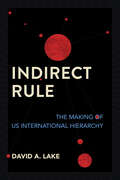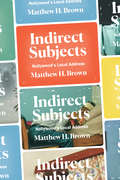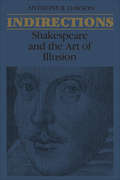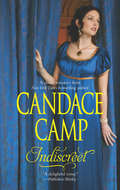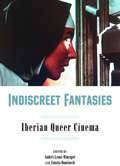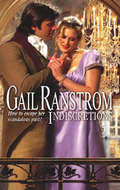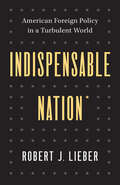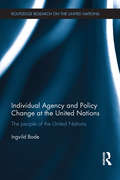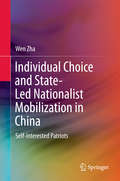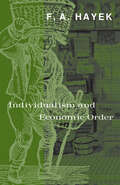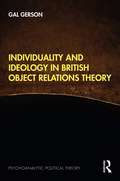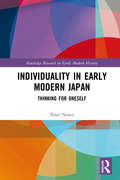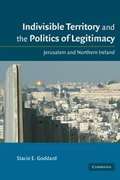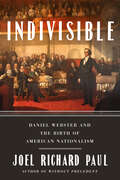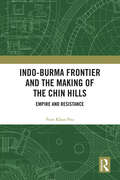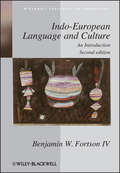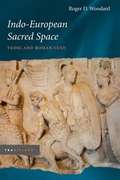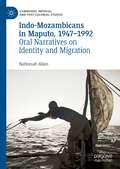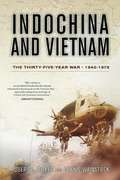- Table View
- List View
Indirect Action: Schizophrenia, Epilepsy, AIDS, and the Course of Health Activism
by Lisa DiedrichThe experience of illness (both mental and physical) figures prominently in the critical thought and activism of the 1960s and 1970s, though it is largely overshadowed by practices of sexuality. Lisa Diedrich explores how and why illness was indeed so significant to the social, political, and institutional transformation beginning in the 1960s through the emergence of AIDS in the United States. A rich intervention—both theoretical and methodological, political and therapeutic—Indirect Action illuminates the intersection of illness, thought, and politics.Not merely a revision of the history of this time period, Indirect Action expands the historiographical boundaries through which illness and health activism in the United States have been viewed. Diedrich explores the multiplicity illness–thought–politics through an array of subjects: queering the origin story of AIDS activism by recalling its feminist history; exploring health activism and the medical experience; analyzing psychiatry and self-help movements; thinking ecologically about counterpractices of generalism in science and medicine; and considering the experience and event of epilepsy and the witnessing of schizophrenia. Indirect Action places illness in the leading role in the production of thought during the emergence of AIDS, ultimately showing the critical interconnectedness of illness and political and critical thought.
Indirect Rule: The Making of US International Hierarchy
by David A. LakeIndirect Rule examines how states indirectly exercise authority over others and how this mode of rule affects domestic and international politics. Indirect rule has long characterized interstate relationships and US foreign relations. A key mechanism of international hierarchy, indirect rule involves an allied group within a client state adopting policies preferred by a dominant state in exchange for the dominant state's support. Drawing on the history of US involvement in the Caribbean and Central America, Western Europe, and the Arab Middle East, David A. Lake shows that indirect rule is more likely to occur when the specific assets at risk are large and governance costs are low. Lake's conceptualization of indirect rule sharpens our understanding of how the United States came to occupy the pinnacle of world power. Yet the consequences of indirect rule he documents—including anti-Americanism—reveal its shortcomings. As US efforts at democracy promotion and other forms of intervention abroad face declining support at home, Indirect Rule compels us to consider whether this method of rule ultimately advances US interests.
Indirect Subjects: Nollywood's Local Address
by Matthew H. BrownIn Indirect Subjects, Matthew H. Brown analyzes the content of the prolific Nigerian film industry's mostly direct-to-video movies alongside local practices of production and circulation to show how screen media play spatial roles in global power relations. Scrutinizing the deep structural and aesthetic relationship between Nollywood, as the industry is known, and Nigerian state television, Brown tracks how several Nollywood films, in ways similar to both state television programs and colonial cinema productions, invite local spectators to experience liberal capitalism not only as a form of exploitation but as a set of expectations about the future. This mode of address, which Brown refers to as “periliberalism,” sustains global power imbalances by locating viewers within liberalism but distancing them from its processes and benefits. Locating the wellspring of this hypocrisy in the British Empire's practice of indirect rule, Brown contends that culture industries like Nollywood can sustain capitalism by isolating ordinary African people, whose labor and consumption fuel it, from its exclusive privileges.
Indirections: Shakespeare and the Art of illusion
by Anthony DawsonThe precise relation between the spectator and the work of art was a matter of great interest to late Renaissance and baroque artists, playwrights as well as painters. In Shakespeare's plays the relation between audience and stage life is crucial. The plays constantly remind the audience of the complex fictiveness of their experience yet they also project a reality specifically through illusion. Indirections is a study of twelve plays in which Shakespeare sets up situations and relationships between the characters analogous to the relationship established between audience and play. This book examines the varied uses of illusion, deceit, disguise, and manipulation in the plays, both comedies and tragedies, and traces Shakespeare's use of illusion through his career — from the buoyant optimism of the great comedies and the ambiguity of the middle years to the new richness and power in the romances. Dawson suggests that the way characters respond to illusory situations sets up a model for the way audiences are meant to respond to the play themselves. Such action at least initially establishes a basis for the movement of characters from self-delusion to self-knowledge. This process of self-realization enables the characters to distinguish truth from appearance, love from infatuation; and significantly, it is a direct result of involvement with illusion and role-playing. It is as if the characters must arrive, within the movement of the plot, at an understanding of, and response to, the nature of drama itself parallel to the audience's experience of the play as a whole. This subtle interplay between audience and characters, where each in a sense represents the other, depends for its life on the physical and psychic distances created by the theatre.
Indiscreet
by Candace CampBenedict Wincross appears in Camilla Ferrand's life as quickly as the gunfire pursuing him. Though his name belies the fact, he is obviously no gentleman. But Camilla realizes Benedict may be just what she needs: a temporary fiancé to satisfy her family's worries.And Benedict needs something in return: an entrée into Chevington Park, Camilla's estate, to conduct an undercover investigation into corruption-without Camilla's knowledge. Each was drawing the other into a dangerous deceit-for even if they survived the danger of Benedict's mission, how would they undo the love between them?
Indiscreet (Mills And Boon M&b Ser.)
by Candace CampA rollicking historical adventure from New York Times bestselling author Candace Camp, originally published in 1997.Benedict Wincross appears in Camilla Ferrand’s life as quickly as the gunfire pursuing him. Though he is obviously no gentleman, Camilla realizes Benedict may be just what she needs: a temporary fiancé to satisfy her family’s worries.And Benedict needs something in return: an entrée into Chevington Park, Camilla’s estate, to conduct an undercover investigation into corruption—without Camilla’s knowledge. Each is drawing the other into a dangerous deceit—for even if they survive the danger of Benedict’s mission, what will they do about the love that’s grown between them?
Indiscreet Fantasies: Iberian Queer Cinema (Campos Ibéricos: Bucknell Studies in Iberian Literatures and Cultures)
by Kelly Moore Joan Ramon Resina Ann Davies Jennifer Brady William Viestenz Nina L Molinaro Ana Corbalán Meredith Lyn Jeffers Darío Sánchez González Ibon Izurieta María Teresa Vera-Rojas Rui Trindade OliveiraPedro Almódovar may have helped put queer Iberian cinema on the map, but there are also multitudes of other LGBTQ filmmakers from Catalonia, Portugal, Castile, Galicia, and the Basque Country who have made the Peninsula one of the world’s most vital sources for queer film. Together, they have produced a cinema whose expressions of queer desire have challenged the region’s conservative religious and family values, while intervening in vital debates about politics, history, and nation. <P><P> Iberian Queer Cinema is a unique collection that offers in-depth analyses of fifteen different films, each by a different director, produced in the region over the past fifty years, from Narciso Ibáñez Serrador’s La residencia (The House That Screamed, 1970) to João Pedro Rodrigues’ O ornitólogo (The Ornithologist, 2016). Together, they show how queer Iberian cinema has responded to historical traumas ranging from the AIDS crisis to the repressive and homophobic Franco regime. Yet they also explore how these films gesture towards a more fluid understanding of sexuality, gender, and national identity. This book will thus give readers a new appreciation for both the cultural diversity of Iberia and the richness of its moving and thought-provoking queer cinema. <P><P> Published by Bucknell University Press. Distributed worldwide by Rutgers University Press.
Indiscretions
by Gail RanstromTropical heat...burning passionDaphne had sacrificed everything to remain unknown in her tropical paradise. But if Lord Lockwood recognized the woman who had fled England with a crime on her conscience, nothing could keep her safe....Even the thought of future punishment could not dampen present desire. Lockwood's lips reawakened the passionate woman she had once been. What harm, Daphne reasoned, could come from one stolen kiss? Still, she could not allow her feelings to overpower her sense-it was too dangerous. She'd denied herself for five years. Surely she could deny Lockwood for a few weeks?
Indispensable Nation: American Foreign Policy in a Turbulent World
by Robert J. LieberA clear-eyed analysis of the role the United States should play in the world as it exists today The United States remains &“the indispensable nation.&” In this book, the distinguished international relations theorist and foreign policy specialist Robert Lieber argues that in a world full of revisionist powers, America&’s role is more important than ever. No other country is capable of playing that role. America remains the essential pillar of the postwar liberal order. It is a center of both political and financial stability, and it promotes important values that the revisionist powers do not. Not beholden to any particular theory, this is a clear-eyed analysis of the role the United States should play in the world as it exists today.
Individual Agency and Policy Change at the United Nations: The People of the United Nations (Routledge Research on the United Nations (UN))
by Ingvild BodeThis book highlights how temporary international civil servants play a crucial role in initiating processes of legal and institutional change in the United Nations system. These individuals are the “missing” creative elements needed to fully understand the emergence and initial spread of UN ideas such as human development, sovereignty as responsibility, and multifunctional peacekeeping. The book: Shows that that temporary UN officials are an actor category which is empirically crucial, yet usually neglected in analytical studies of the UN system. Focussing on these particular individual actors therefore allows for a better understanding of complex UN decision-making. Demonstrates how these civil servants matter, looking at what their agency is based on. Offering a new and distinctive model, Bode seeks to move towards a comprehensive conceptualisation of individual agency, which is currently conspicuous for its absence in many theoretical approaches that address policy change Uses three key case studies of international civil servants (Francis Deng, Mahbub ul Haq and Marrack Goulding) to explore the possibilities of this specific group of UN individuals to act as agents of change and thereby test the prevailing notion that international bureaucrats can only act as agents of the status quo. This book will be of great interest to students and scholars of international organizations and the United Nations.
Individual Choice and State-Led Nationalist Mobilization in China
by Wen ZhaThis book presents a comparative historical analysis of state-led nationalist movements in Chinese history, which counters current claims that popular nationalism in present-day China is strong enough to sustain costly expansionist wars. Popular nationalism in China has been on the rise since the early 1990s to the concern of many observers. Some have even asked whether China will become another Germany. A comparative historical analysis of pre-war and wartime nationalist mobilization helps us better understand how individuals formulate their opinions under extreme conditions. It concludes that the public's weak perception of foreign threats, taken together with pro-minority domestic institutions, may significantly undermine the state's efforts at nationalist mobilization and thus limit its capability to pursue external expansion or other strategic goals.
Individual Rights and the Making of the International System
by Christian Reus-SmitWe live today in the first global system of sovereign states in history, encompassing all of the world's polities, peoples, religions and civilizations. Christian Reus-Smit presents a new account of how this system came to be, one in which struggles for individual rights play a central role. The international system expanded from its original European core in five great waves, each involving the fragmentation of one or more empires into a host of successor sovereign states. In the most important, associated with the Westphalian settlement, the independence of Latin America, and post-1945 decolonization, the mobilization of new ideas about individual rights challenged imperial legitimacy, and when empires failed to recognize these new rights, subject peoples sought sovereign independence. Combining theoretical innovation with detailed historical case studies, this book advances a new understanding of human rights and world politics, with individual rights deeply implicated in the making of the global sovereign order.
Individual Rights: The Blessings of Liberty
by Perfection LearningWHAT PREVENTS TYRANNY?<P> The question above is the essential question that you will consider as you read this book. The selections, activities, and organization of the book will lead you to think critically about this question and to develop a deeper understanding of how effectively the Constitution, Bill of Flights, and other amendments guard individual liberties.<P> Included are sections on:<P> * How would society be different without the First Amendment? <P> * How well does federalism protect individual rights? <P> * Why are suspects' rights important?<P> * Thinking on Your Own
Individual and Community in Nietzsche's Philosophy
by Julian YoungAccording to Bertrand Russell, Nietzsche's only value is the flourishing of the exceptional individual. The well-being of ordinary people is, in itself, without value. Yet there are passages in Nietzsche that appear to regard the flourishing of the community as a whole alongside, perhaps even above, that of the exceptional individual. The ten essays that comprise this volume wrestle with the tension between individual and community in Nietzsche's writings. Some defend a reading close to Russell's. Others suggest that Nietzsche's highest value is the flourishing of the community as a whole and that exceptional individuals find their highest value only in promoting that flourishing. In viewing Nietzsche from the perspective of community, the essays also cast new light on other aspects of his philosophy, for instance, his ideal of scientific research and his philosophy of language.
Individualism and Economic Order
by F. A. Hayek“These essays . . . bring great learning and . . . intelligence to bear upon economic and social issues of central importance to our era.” —Henry Hazlitt, NewsweekIn this collection of writings, Nobel laureate Friedrich A. Hayek discusses topics from moral philosophy and the methods of the social sciences to economic theory as different aspects of the same central issue: free markets versus socialist planned economies. First published in the 1930s and 40s, these essays continue to illuminate the problems faced by developing and formerly socialist countries.F. A. Hayek, recipient of the Medal of Freedom in 1991 and winner of the Nobel Memorial Prize in Economics in 1974, taught at the University of Chicago, the University of London, and the University of Freiburg. Among his other works published by the University of Chicago Press is The Road to Serfdom, now available in a special fiftieth anniversary edition.“There is much interesting and valuable material in this meaty . . . book which must ultimately help the world make up its mind on a vital issue: to plan or not to plan?” —S. E. Harris, The New York Times“Those who disagree with him cannot afford to ignore him . . . This is especially true of a book like the present one.” —George Soule, Nation
Individuality and Ideology in British Object Relations Theory (Psychoanalytic Political Theory)
by Gal GersonFollowing the work of prominent object relations theorists, such as Fairbairn, Suttie and Winnicott, Gal Gerson explores the correlation between analytical theory and intellectual environment in two ways. He notes the impact that the British object relations school had on both psychology and wider culture, and suggests that the school’s outlook involved more than a clinical choice. Gerson first interprets the object relations model as a political theory that completes a certain internal development within liberalism. He later outlines the relationship between the analytical theory and the historical setting in which it formed and took root. By engaging with these questions, Gerson demonstrates the deeper structure and implications of object relation theory for social philosophy. This allows him to answer questions such as: ‘What kind of social arrangements do we endorse when we accept object relations theory as a fair description of mind?’; ‘What beliefs about power, individuality, and household structure do we take in? What do we give up when doing so?’; and, lastly, ‘What does it say about contemporary advanced societies that they have taken in much of the theory’s content?’ Proposing a novel rethinking of human nature, Individuality and Ideology in British Object Relations Theory provides much-needed insight into how this school of psychoanalytic theory has impacted contemporary social and political life.
Individuality and Modernity in Berlin
by Moritz FöllmerMoritz Föllmer traces the history of individuality in Berlin from the late 1920s to the construction of the Berlin Wall in August 1961. The demand to be recognised as an individual was central to metropolitan society, as were the spectres of risk, isolation and loss of agency. This was true under all five regimes of the period, through economic depression, war, occupation and reconstruction. The quest for individuality could put democracy under pressure, as in the Weimar years, and could be satisfied by a dictatorship, as was the case in the Third Reich. It was only in the course of the 1950s, when liberal democracy was able to offer superior opportunities for consumerism, that individuality finally claimed the mantle. Individuality and Modernity in Berlin proposes a fresh perspective on twentieth-century Berlin that will engage readers with an interest in the German metropolis as well as European urban history more broadly.
Individuality in Early Modern Japan: Thinking for Oneself
by Peter NoscoTwo of the most commonly alleged features of Japanese society are its homogeneity and its encouragement of conformity, as represented by the saying that the nail that sticks up gets pounded. This volume’s primary goal is to challenge these and a number of other long-standing assumptions regarding Tokugawa (1600-1868) society, and thereby to open a dialogue regarding the relationship between the Japan of two centuries ago and the present. The volume’s central chapters concentrate on six aspects of Tokugawa society: the construction of individual identity, aggressive pursuit of self-interest, defiant practice of forbidden religious traditions, interest in self-cultivation and personal betterment, understandings of happiness and well-being, and embrace of "neglected" counter-ideological values. The author argues that when taken together, these point to far higher degrees of individuality in early modern Japan than has heretofore been acknowledged, and in an Afterword the author briefly examines how these indicators of individuality in early modern Japan are faring in contemporary Japan at the time of writing.
Indivisible Territory and the Politics of Legitimacy
by Stacie E. GoddardIn Jerusalem and Northern Ireland, territorial disputes have often seemed indivisible, unable to be solved through negotiation, and prone to violence and war.
Indivisible: Daniel Webster and the Birth of American Nationalism
by Joel Richard PaulThe story of how Daniel Webster popularized the ideals of American nationalism that helped forge our nation&’s identity and inspire Abraham Lincoln to preserve the Union When the United States was founded in 1776, its citizens didn&’t think of themselves as &“Americans.&” They were New Yorkers or Virginians or Pennsylvanians. It was decades later that the seeds of American nationalism—identifying with one&’s own nation and supporting its broader interests—began to take root. But what kind of nationalism should Americans embrace? The state-focused and racist nationalism of Thomas Jefferson and Andrew Jackson? Or the belief that the U.S. Constitution made all Americans one nation, indivisible, which Daniel Webster and others espoused? In Indivisible, historian and law professor Joel Richard Paul tells the fascinating story of how Webster, a young New Hampshire attorney turned politician, rose to national prominence through his powerful oratory and unwavering belief in the United States and captured the national imagination. In his speeches, on the floors of the House and Senate, in court, and as Secretary of State, Webster argued that the Constitution was not a compact made by states but an expression of the will of all Americans. As the greatest orator of his age, Webster saw his speeches and writings published widely, and his stirring rhetoric convinced Americans to see themselves differently, as a nation bound together by a government of laws, not parochial interests. As these ideas took root, they influenced future leaders, among them Abraham Lincoln, who drew on them to hold the nation together during the Civil War. As he did in Without Precedent and Unlikely Allies, Joel Richard Paul has written in Indivisible both a compelling history and a fascinating account of one of the founders of our national perspective.
Indo-Burma Frontier and the Making of the Chin Hills: Empire and Resistance
by Pum Khan PauThis book examines the British colonial expansion in the so-called unadministered hill tracts of the Indo-Burma frontier and the change of colonial policy from non-intervention to intervention. The book begins with the end of the First Anglo-Burmese War (1824–26), which resulted in the British annexation of the North-Eastern Frontier of Bengal and the extension of its sway over the Arakan and Manipur frontiers, and closes with the separation of Burma from India in 1937. The volume documents the resistance of the indigenous hill peoples to colonial penetration; administrative policies such as disarmament; subjugation of the local chiefs under a colonial legal framework and its impact; standardisation of ‘Chin’ as an ethnic category for the fragmented tribes and sub-tribes; and the creation and consolidation of the Chin Hills District as a political entity to provide an extensive account of British relations with the indigenous Chin/Zo community from 1824 to 1935. By situating these within the larger context of British imperial policy, the book makes a critical analysis of the British approach towards the Indo-Burma frontier. With its coverage of key archival sources and literature, this book will interest scholars and researchers in modern Indian history, military history, colonial history, British history, South Asian history and Southeast Asian history.
Indo-European Language and Culture: An Introduction (Blackwell Textbooks in Linguistics #30)
by Benjamin W. Fortson IVThis revised and expanded edition provides a comprehensive overview of comparative Indo-European linguistics and the branches of the Indo-European language family, covering both linguistic and cultural material. Now offering even greater coverage than the first edition, it is the definitive introduction to the field. Updated, corrected, and expanded edition, containing new illustrations of selected texts and inscriptions, and text samples with translations and etymological commentary Extensively covers individual histories of both ancient and modern languages of the Indo-European family Provides an overview of Proto-Indo-European culture, society, and language Designed for use in courses, with exercises and suggestions for further reading included in each chapter Includes maps, a glossary, a bibliography, and comprehensive word and subject indexes
Indo-European Sacred Space: Vedic and Roman Cult
by Roger D. WoodardIn Indo-European Sacred Space, Roger D. Woodard provides a careful examination of the sacred spaces of ancient Rome, finding them remarkably consistent with older Indo-European religious practices as described in the Vedas of ancient India. Employing and expanding on the fundamental methods of Émile Benveniste, as well as Georges Dumézil's tripartite analysis of Proto-Indo-European society, Woodard clarifies not only the spatial dynamics of the archaic Roman cult but, stemming from that, an unexpected clarification of several obscure issues in the study of Roman religion. Looking closely at the organization of Roman religious activity, especially as regards sacrifices, festivals, and the hierarchy of priests, Woodard sheds new light on issues including the presence of the god Terminus in Jupiter's Capitoline temple, the nature of the Roman suovetaurilia, the Ambarvalia and its relationship to the rites of the Fratres Arvales, and the identification of the "Sabine" god Semo Sancus. Perhaps most significantly, this work also presents a novel and persuasive resolution to the long standing problem of "agrarian Mars."
Indo-Mozambicans in Maputo, 1947-1992: Oral Narratives on Identity and Migration (Cambridge Imperial and Post-Colonial Studies)
by Nafeesah AllenThis book explores the experiences of ‘Indo-Mozambicans,’ citizens and residents of Mozambique who can trace their origins to the Indian subcontinent, a region affected by competing colonialisms during the twentieth century. Drawing from ethnographic interviews, the author illustrates why migration developed as both an identity marker and a survival tool for Indo-Mozambicans living in Maputo, in response to the series of independence movements and prolonged period of geo-political uncertainty that extended from 1947 to 1992. A unique examination of post-colonialism, the book argues that four pivotal moments in history forced migratory patterns and ethnic identity formations to emerge among Indo-Mozambicans, namely, the end of the British empire in India and the subsequent partition of India and Pakistan in 1947; the end of the Portuguese empire in India, with the annexation of Goa, Daman and Diu in 1961; the independence of Mozambique from Portugal in 1975; and the civil war of Mozambique from 1977 to 1992. Framing these historical markers as trigger points for shifts in migration and identity formation, this book demonstrates the layered experiences of people subject to Portuguese colonialism and highlights the important perspective of those ‘left behind’ in migration studies.
Indochina and Vietnam
by Robert Miller Dennis D. WainstockThe Indochina and Vietnam Wars followed one another over thirty-five years, from 1940 to 1975, yet these two closely related conflicts are usually treated separately. This book seeks to tell the story of those wars as a single historical event. Within days of France's defeat by Nazi Germany and Japan's military expansion into Southeast Asia in July 1940, the United States became involved in Indochina. Most histories quickly mention the colonial past, usually limited to the battle of Dien Bien Phu, to concentrate exclusively on the American war. A selection of published sources explains the context and the development of the long war while providing an overview of France's imprint on Indochina and Vietnam.The question "Why were we in Vietnam?" comes up regularly regarding the root causes for the ultimate deployment of over five hundred thousand US troops, most of them conscripts, into a virtually unknown land. When France left Indochina in 1954 it became an American problem. Weeks before the murder of John F. Kennedy came the overthrow of Ngo Dinh Diem and the escalation of the war in 1965-68. Finally, Richard Nixon, after extending the war into Cambodia, enacted both the Vietnamization process and negotiations in Paris between Henry Kissinger and Le Duc Tho, until the final act in April 1975, when the US embassy rooftop with the last helicopter taking off was flashed around the world as the grand finale to the war.

